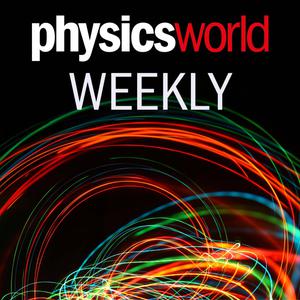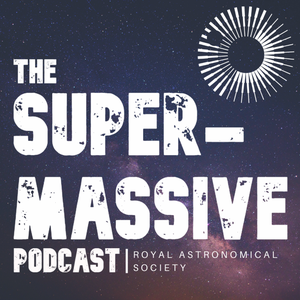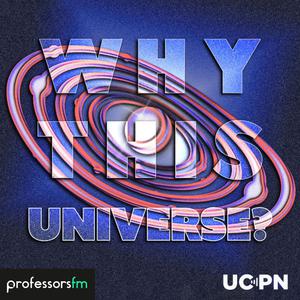
Physics Frontiers
Jim Rantschler
Journeys to the Outer Limits of Theoretical Physics
- 59 minutes 31 secondsEpisode 79: Primordial Black Holes with QCD Color Charge with Elba Alonso-Monsalve and David Kaiser
Jim talks with Elba Alonso-Monsalve and David Kaiser about the prospects to describe dark matter as tiny black holes that were created at the end of cosmic inflation. Due to the large inhomogeneities in the distribution of matter at that time, the black holes could form directly from the matter distribution and not be color neutral (in the sense of QCD).
Show notes: http://frontiers.physicsfm.com/794 September 2024, 1:11 am - 51 minutes 5 secondsEpisode 78: Quantum Machine Learning with Bruna Shinohara
Jim talks with Bruna Shinohara of CMC Microsystems. Quantum computing and machine learning are both currently making huge strides. So it is not strange that people are trying to use quantum computing for machine learning.
31 May 2024, 10:35 pm - 1 hour 21 minutesEpisode 77: Maxwellian Ratchets with Alex Jurgens
Jim talks with Alex Jurgens about Maxwellian ratchets, automata that are similar to Maxwell's Demon. They talk about their implications for information processing and entropy.
http://frontiers.physicsfm.com/7731 March 2024, 5:52 pm - 49 minutes 40 secondsEpisode 76: Undeciability and Theories of Everything with Claus Kiefer
Jim talks with Claus Kiefer about the implications of Goedel's incompleteness theorems on the search for the theory.
Show Notes: http://frontiers.physicsfm.com/7629 January 2024, 2:38 am - 1 hour 7 minutesEpisode 75: Categorical Probability and the Measurement Problem
Jim talks with Nick Ormrod and V. Vilasini about their use of categorical probability theory to analyze the measurement problem. We discuss categorical probability theory, which allows them to abstract from particular mathematical formulations of quantum mechanics to more general ideas about states and measurements and observers than found in Hilbert space formulations. They use this to look at the various properties of quantum mechanics and how they relate to each other, in particular how relativity affects the measurement problem.
Show Notes: http://frontiers.physicsfm.com/7520 August 2023, 1:08 pm - 50 minutes 23 secondsEpisode 74: Stochastic Thermodynamics with David Wolpert
Jim talks with David Wolpert about the non-equilibrium behavior of computation, what it means for entropy, and how it relates to traditional thermodynamics.
Show Notes: http://frontiers.physicsfm.com/749 July 2023, 1:47 pm - 1 hour 43 secondsEpisode 73: Quantum Money with Jiahui Liu
Jim discusses quantum money with Jiahui Liu. Quantum money is a linchpin of quantum cryptography. The ability to create secure banknotes using quantum computers would allow even more secure methods of encryption for communications.
18 June 2023, 1:36 pm - 1 hour 13 minutesEpisode 72: Born Rule and Gravity with Antony Valentini
Jim talks with Antony Valentini about the difficulties of interpretation of quantum mechanics in light of quantum gravity. In particular, Antony discusses the failure of the Born Rule due to the impossibility of normalization (the fact that probabilities must sum to 100%) at that scale, and therefore the need to interpret the wavefunction as something more than merely the knowledge of the observer about the system. They spend some time talking about the de Broglie-Bohm interpretation in light of quantum gravity.
Show Notes: http://frontiers.physicsfm.com/7223 April 2023, 10:03 pm - 45 minutes 39 secondsEpisode 71: Primordial Graviton Background
Jim talks with Sunny Vagnozzi about using the Primoridial Graviton Background to rule out all inflation models.
Show Notes: http://frontiers.physicsfm.com/7119 February 2023, 3:40 pm - 46 minutes 30 secondsEpisode 70: Path Integrals and Entanglement with Ken Wharton
Jim talks with Ken Wharton about how to describe entangled states as sums over histories of particle paths using the path integral method. He shows how this works for Bell-type experiments, entanglements swapping, delayed choice experiments, and the triangle network. This leads to a second way to describe what happens quantum mechanically without introducing non-locality (but requiring other classical ideas to break down).
Show Notes: http://frontiers.physicsfm.com/7018 December 2022, 3:46 pm - 43 minutesEpisode 69: The Flavor Puzzle with Joe Davighi
Jim talks with Joe Davighi of the University of Zurich about the flavor unification at high energies - the merging of all leptons into one kind of particle. The discussion includes symmetries in particle physics, symmetry breaking at low temperatures, and unification schemes in general. Joe also discusses both leptoquarks and proton stability in the context of his theory.
20 November 2022, 2:19 pm - More Episodes? Get the App
Your feedback is valuable to us. Should you encounter any bugs, glitches, lack of functionality or other problems, please email us on [email protected] or join Moon.FM Telegram Group where you can talk directly to the dev team who are happy to answer any queries.
 Quanta Science Podcast
Quanta Science Podcast
 SpaceTime with Stuart Gary
SpaceTime with Stuart Gary
 Physics World Weekly Podcast
Physics World Weekly Podcast
 The Supermassive Podcast
The Supermassive Podcast
 Why This Universe?
Why This Universe?
 Ask a Spaceman!
Ask a Spaceman!